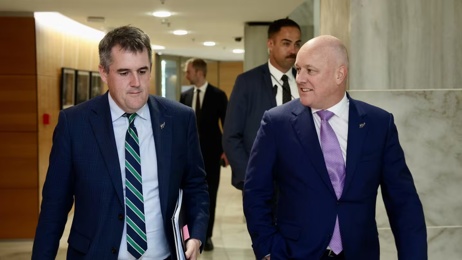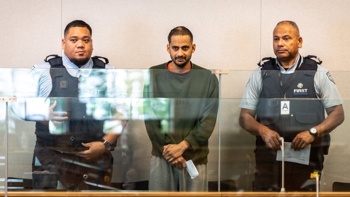Justice Minister Paul Goldsmith is considering ways to reduce the number of jury trials, saying an increase in defendants choosing them is contributing to delays.
Data released under the Official Information Act shows a rise in defendants electing jury trials over judge-only trials. The choice is available only in category 3 cases, which carry a maximum penalty of two or more years in prison.
The data shows that, of category 3 cases disposed last year in which a judge-alone trial or jury trial was involved, nearly a third were jury trials, compared with less than a quarter in 2018.
Goldsmith says defendants’ increased choice of jury trials is a factor in court delays, and speeding up the system is one of his priorities.
Ministry of Justice figures show that, in the past five years, the average number of days to dispose of a criminal case in the district court has gone from 119 to 178 days.
A jury trial in the district court has gone from an average of 348 to 497 days.
Goldsmith says the threshold for choosing jury trial is being considered as part of a wider suite of changes, “but it’s an area we’d have to tread carefully on”.
 Justice Minister Paul Goldsmith, pictured with Prime Minister Christopher Luxon, says his top priority is to reduce delays in hearing court cases. Photo / Mark Mitchell
Justice Minister Paul Goldsmith, pictured with Prime Minister Christopher Luxon, says his top priority is to reduce delays in hearing court cases. Photo / Mark Mitchell
Prime Minister Christopher Luxon told radio host Mike Hosking that the speed of justice was a big challenge.
“There’s a big backlog there. Part of it will be whether it’s judge or jury trialled, but essentially things like new technology, using tele-presence, all those sorts of things.
- Judge or jury trial, which is better?
- 'Out of control': Underfunding in justice system causes 'real challenges'
- Law and order changes prioritise public safety, claims Justice Minister
“We’ve got to be able to embrace more modern tools to get people through the system much quicker.”
Goldsmith said it was a problem that people’s lives were on hold for years while waiting for justice.
“I don’t think there was the focus on it that there needed to be under the previous Government, and we certainly do see it as one of the nuts-and-bolts issues of justice to really focus the system on trying to get faster justice.”
Nelson barrister Chris Macklin said the category of defendants eligible to elect a jury trial was set out in the Criminal Procedure Act 2011.
“The category 3 threshold of two years is higher than the old threshold, which was three months, so almost anything that had prison on it could be a jury trial before the Criminal Procedure Act went in.
“The assumption was that, by putting up the threshold, there would be a decrease in jury trials, but that has not been the outcome.”
Labour justice spokesperson Duncan Webb says the right to be judged by one's peers or community is deeply embedded in our law and identity. Photo / Mark Mitchell
Labour justice spokesperson Duncan Webb said two years’ imprisonment was a significant deprivation of liberty and anyone at risk of that had a right to a trial by jury.
However, sentence indications could be a way to reduce the number.
“If the answer is to make it very clear that, for this crime, there won’t be a sentence of imprisonment, even though the maximum sentence is two years, that could conceivably work,” he said.
“[But] to require people who are possibly being sent away for two years to have a judge-only trial, I think that’s a serious undermining of fair trial rights.”
Webb said the idea of being judged by your peers or community was ancient and deeply embedded in our identity.
“The idea that, whatever we do, if it is judged by our community to be wrong then it is in some ways more legitimate than if it is one person sitting in judgment over us.”
Webb said he also wanted the justice system to move quickly, but making decisions about fair trials based on resourcing was wrong.
Macklin said the increased number of jury trials strained the court system because they required more time, space and resources.
“Finding a time to convene 12 random people takes a fair whack of time in and of itself.”
Anecdotally, he said, defendants elected jury trials because of a perception of receiving a fairer trial, a desire to get one’s “day in court, " and to go through a slower court process.
The current demand for jury trials required more resources.
“If people are determined to maintain the right to a trial by jury in the same form that we currently have it, then the only answer can be more resources.
“More courtrooms, more judges qualified to preside over juries and therefore more ability to turn over jury trials more promptly.”
Other factors affecting court delays have previously been identified as people pleading guilty later in the court process and more adjournments of court events, with existing pressures exacerbated by Covid restrictions.
Efforts to speed up the court system in the Criminal Process and Improvement Programme have been ongoing for several years.
Goldsmith said: “There’s about 20-odd things that we’re working on in order to reduce those delays, and once we’ve done those it’ll be another 20 things.
“It’s a consistent matter of focusing all the justice sector on trying to reduce those delays.”
This article was originally published on the NZ Herald, here.
Take your Radio, Podcasts and Music with you









